- Home
- Susanna Kearsley
Mariana Page 11
Mariana Read online
Page 11
“Oh, I see. Well, it doesn’t feel very funny from this end. It feels rather ominous, if you must know.”
“The calm before the storm?”
“More like… like I’m being watched,” I told him. “Like somebody’s standing behind me, watching me. And waiting.”
“Waiting for what, do you think?”
I shook my head, not caring that he couldn’t see the gesture. “I don’t know. I don’t suppose you have any useful suggestions in that bundle of information you got from the librarian?”
“Not really, no.” He flipped through the papers again. “Oh, but there were a couple of other statements I thought you’d find interesting…”
“Yes?”
“There seems to be a lot of evidence that we surround ourselves with the same people in each life—that your father in one life becomes your friend in the next, and so on. They’re sometimes referred to as soul mates, those people to whom you take an instant liking without really knowing why.”
“So you could have been my brother in a past life.”
“Or your husband,” Tom teased. “Or your son. Or your daughter, come to that. Sex doesn’t appear to remain constant from one lifetime to another.”
“All right.” I accepted the information. “And what was the other point you thought would interest me?”
“Ah.” Tom said. “Well, the next bit is a little touchy, but… most of the people involved in one of the studies said that they had actually chosen to be reborn; that they had sort of stayed in limbo, if you like, until an opportune moment presented itself.”
“So?”
“So you said that this ghost, this Green Lady in your garden, hasn’t been seen by anybody for about thirty years?”
“That’s what I’m told.”
“And has it never occurred to you,” Tom said slowly, “that it was about thirty years ago that you were born?”
***
Tread lightly, she is near… The words sprang, naturally and unbidden, to my troubled mind as I stood alone in the walled churchyard, gazing down at the overgrown grave of Mariana Farr. The poem was an old one, by Oscar Wilde. I’d had to memorize it once at school, and even now, years later, I could still remember the final, haunting line: All my life’s buried here, Heap earth upon it.
But surely, I told myself, that was wrong. I ought to be digging to uncover the past, not heaping earth upon it to cover it up. Frowning, I thrust my hands deeper into the pockets of my jeans and stared hard at the plain little stone. All my life’s buried here…
A chill breeze lifted the hair from my forehead and I turned away, lowering my head in silent contemplation as I trudged with heavy footsteps towards the church. As before, the huge wooden door opened easily to my touch. Standing in the hushed, cool interior, I marveled once again at the exquisite stillness of the place, and the romantic, abandoned aura that permeated it. Like the ruins of Glastonbury Abbey, with the grass growing atop the high roofless walls, this little church gave one the impression that all the people had left a very long time ago.
Which was silly, I thought, since come Sunday the pews would probably all be filled with the faithful of modern-day Exbury. But the impression lingered, nonetheless. I would have sat awhile myself in one of the scarred and burnished pews, enjoying the peaceful, undemanding atmosphere, but a sound from outside the church caught my attention. It was, at first, a faint sound, filtering through the thick stone walls like the insistent tap, tap of a tree branch against a windowpane, but it drew closer and grew steadily in volume, until I could clearly hear the sound of a horse’s hooves pounding the tightly packed earth of the path that wound behind the church—the path that led to the manor house.
Curious, I stepped outside again and rounded the west wall of the church, walking the short distance across the grass to the low gate that led on to the manor-house path. Although I could hear the horse quite plainly, I could see nothing, and I stepped out onto the path for a better view.
The dizziness came upon me rather suddenly. I barely had time to lift my fingers to my throbbing temples, closing my eyes against a blinding explosion of light, when I heard a loud explosive oath behind me and turned to see a massive pair of hooves neatly slicing the air just inches from my face. Stunned, I fell back, bruising my hip against a stone as I did so. Pinned by the tangled weight of my gown against my legs, I could only stay there, half sitting and half lying in the dirt, staring up at the man whose expert horsemanship had no doubt just saved my life.
I couldn’t see his face—the sun was to his back, and I had only the barest glimpse of a hard profile as he worked to steady the dancing gray horse. But while I couldn’t see his expression, I was certain that he wasn’t smiling.
“Christ’s blood, woman!” he swore again, confirming my suspicions. “Can you not watch where you are going? D’you wish for death?”
Wide-eyed and silent, I shook my head, unsure as to which of the two questions I was answering. The outline of his jaw tightened, as if he were preparing to give a lecture, but he only exhaled a tight, exasperated sigh and looked away for a moment, letting me see that hard, finely drawn profile in greater detail. When he looked at me again and spoke, his voice was quieter, and almost kind.
“Are you hurt?”
Again, I shook my head, and sensed his smile.
“Can you not speak, Mariana Farr?” he asked. “I’d heard that girls from London were uncommonly good at it.”
My blood chilled nervously. “I am not from London, sir. I come from Southampton.”
“’Tis odd,” he said, lightly. “I stood a drink to a man not a week ago who claimed he was a coachman come from London. He told me he had brought hence but one passenger, and that a girl with hair as fair as ripened barley. He waxed poetic in his cups, this coachman did, but he did not impress me as a liar.” I said nothing, and he went on speaking, still in that light and careless tone. “You need not look so frightened—I’ll not tell. I am no peasant, mistress, to cross myself and mutter prayers when someone whispers ‘plague,’ and I would not see you driven from the town by those who have no wit to see you carry not the sickness.”
I pushed myself to my feet, brushing the dust from my gown with fingers that shook only slightly. “You have me at a disadvantage, sir,” I told him, in as dignified a voice as I could muster, squinting up at him against the sun. “You know my name.”
“Ay, well, we’ve precious few strangers in Exbury in these times,” he explained, “and fewer still that… warrant my interest.” His shadowed gaze burnt me where I stood, and the smile in his voice was even more in evidence. Perhaps taking pity on my eyesight, he drew the horse around so that the sun was no longer directly behind him, and lifting his hat with a flourish he bent his head in a mocking bow.
“Richard de Mornay, at your service,” he introduced himself.
“Sir.” I inclined my own head in response, partly because I could not entirely abandon my own good manners, and partly because I could not bear to look at his face any longer. It was a beautiful face, lean and darkly handsome, framed by a neatly trimmed dark beard and loose waves of natural dark hair, not one of the elaborate wigs I’d grown so used to seeing in the City.
Nor was his dress fashionably effeminate. He wore a simple black waistcoat and narrow breeches, with a long black jacket and high leather boots. The material of his clothing was very fine, and heavily embroidered, but it was not gaudy, and thus looked all the more expensive. I found myself wondering about Richard de Mornay. He seemed quite different from the plain-speaking farmers and merchants I had met since my arrival.
“You are certain you are not injured?” he asked again.
“I am certain. Thank you.” I kept my head lowered, waiting for him to move on. When he did not, I chanced another look up at him, and found him watching me.
“Then I wish you good day, mistres
s,” he said slowly, nodding once more before replacing the hat on his head and turning the horse towards the village. “Mind you take care on this road in future.”
I had the oddest impression that he was warning me against something other than being run down by a horse, but before I had time to fully register his words he was gone, and I was left standing in the middle of the path like a fool. Pulling myself together with an effort, I left the path and walked home across the fields, not wishing to chance another meeting with Richard de Mornay on the village street.
My uncle’s house, viewed from the back across the roughened fields, was a dismal and unwelcoming sight. In the few days that I had spent there since my flight from London I had learned to dread the place, as I had in my childhood dreaded the forbidding sight of the Tower of London. Both, in their way, were prisons.
There was no rational basis for my impression, nor for my growing fear of my uncle. I had not been mistreated, I had been accepted without question into the daily life of the family, and Uncle Jabez’s manner towards me was invariably courteous, if somewhat distant. But I had nonetheless begun to feel uneasy, like a child roaming the hallways of a strange house in the dead of night, expecting at every turn to encounter some indescribably hideous monster. Indeed, as the days passed, I became increasingly aware of this monster’s presence; I could almost feel it, lurking beneath the facade of the daily routine, like the serpent in the Garden of Eden. And although I could not yet put a face to it, I was certain of its existence.
With dragging footsteps, I entered the house through the back door and found Rachel in the kitchen, up to her elbows in pastry. She looked up, smiling and streaked with flour.
“Did you have a good walk?” she asked, and then, as I nodded, “I was beginning to worry for you, you were away so long.”
“I went to the churchyard, to see the grave of my grandfather,” I explained, my voice absent. “Rachel, what do you know of a man named Richard de Mornay?”
She looked up sharply, hesitating, and her eyes slid past me, widening in sudden apprehension. I had not heard my uncle enter the room, but I felt him behind me before he spoke.
“Richard de Mornay,” he repeated, his voice lingering unpleasantly on the words. “How do you know of him?”
“We passed on the road today,” I answered truthfully, “and he spoke to me.”
“He… spoke to you. And that is all?”
“Yes.”
“And yet you ask after him.”
The interrogation was grating sorely on my nerves, but I controlled my temper with an effort and kept my voice as even as I could. “I asked after him because I was curious,” I said, raising my chin a little. “His clothes were uncommonly fine, and he rode a lovely horse.” I swallowed, meeting my uncle’s eyes. “I was curious,” I said again.
Jabez Howard held my gaze for a long moment before he lowered his eyes and smiled, releasing me.
“Sir Richard de Mornay,” he said, his tone conversational, “is the young lord of Crofton Hall. He is of an ancient family, and holds the rank of baronet from his father, who died five years ago. He is a man to be respected, but,” he caught my eyes again, “he is not a gentleman. The devil dwells in Richard de Mornay. You will not speak to him again.”
He turned and walked into the dining room, leaving me standing by the hearth in a sudden chill. A strange noise penetrated the oppressive silence, a shrill and persistent ringing sound that grew steadily louder, coming in short, staccato bursts. The room wavered, shimmering like the horizon on a hot summer afternoon, and the walls and furniture reassembled themselves before coming into focus once more, clear and comfortingly solid.
I was standing in the pantry of my own house, facing the kitchen door, listening to the insistent ringing of the telephone in the front hall. I just let it go on ringing, staring dumbly at the open door, until the last vibration of sound had died away. Reality trickled back in slow, disjointed streams of conscious thought, and it seemed an eternity before I could summon the will to move from my spot by the pantry wall into the spacious, air-filled front hallway, where I stood looking down at the sleek black telephone as though it were a being from another planet.
And as I stood there, staring at it, with one hand partially outstretched, it began to ring again.
Chapter 12
The next day dawned fair and warm, bringing with it the first faint hint of summer’s approaching heat. By early afternoon the clouds that had been in evidence that morning had dwindled to insubstantial wisps of transparent white, barely discernible against the brilliant blue sky, and the sun hung like a great yellow jewel in their midst.
In the wide flowered borders that lined the gravel front drive of Crofton Hall, the bees were busily at work, single-mindedly unconcerned with the rather noisy and intrusive presence of the queue of tourists waiting in jostling, chatty good humor for the start of the one fifteen tour.
Beside me, on the lawn, Geoff stopped walking and bent to retie his shoelace, casting a quick assessing glance at the gathering crowd.
“Saturday’s always our best day,” he told me. “We’d better give this lot a quarter of an hour’s start so we don’t get any stragglers joining in with our tour.” He stood, smiling. “Care for a stroll round the rose garden?”
A week had not diminished the effect of that smile. A few curious eyes followed us as we made our way across the front lawn, but it was an idle curiosity and I doubted whether any of the tourists realized that the handsome young man, casual in denim jeans and bright-red polo shirt, was in fact the owner of Crofton Hall.
But they might have wondered who the devil I was. Geoff had sounded so formal on the telephone yesterday that I had unconsciously ascribed that same formality to the tour itself, and had selected from my wardrobe a dignified paisley skirt, cream-colored silk blouse, and ridiculously expensive Italian shoes with foolish heels that sank into the soft lawn with every step. To keep from getting stuck, I had to adopt a slightly stilted walk that put most of my weight on the balls of my feet. I silently blessed Geoffrey de Mornay, who, chivalrous to a fault, had slowed his gait to accommodate mine.
The rose garden, I learned, occupied a goodly portion of the lawn against the northern boundary wall that divided the churchyard from the manor lands. Stretched tall against the sky, the square tower of the church peered at us over the high stone wall as we walked along the tranquil pathways. The garden itself had an aura of the Renaissance about it—very neat, very precise, very orderly; yet all the geometrically laid-out beds with their neat edges could not disguise the delightfully tangled growth that they contained.
“Of course,” Geoff conceded, “it’s more impressive in the summer, when things are in bloom…”
“It’s lovely,” I assured him. “I don’t think I’ve ever seen a garden design this intricate before.”
“Yes, well, we had a devil of a time restoring it until Iain figured out that it followed the pattern of the dining-room ceiling.” Geoff smiled. “I’m told there was a maze around the west side of the house that was planted in the same design—big yew hedges, quite impressive—but one of the Victorian owners chopped it all down. Built a rather ugly fountain in its place. Italianate. Lots of statues.”
“What a shame.” I had a childish fondness for mazes. I still remembered getting lost in the maze at Hampton Court on one of our memorable family holidays. My father had led us round and round in increasingly elaborate circles until Tommy, feeling hungry and not wanting to miss his dinner, had taken charge and steered us all unerringly back to the entrance…
“What’s so funny?” Geoff wanted to know, so I shared the memory with him.
He had an engaging laugh—a deep, resonant baritone—and I liked the way his eyes crinkled up at the corners.
“Do you only have the one brother?” he asked me.
I nodded. “Just the two
of us. I don’t think my parents could have stood any more children, quite frankly. We were enough of a handful.”
“Really?” He looked down with interest. “You don’t look like someone who was a difficult child.”
“Looks are deceiving,” I assured him. “If I wasn’t in the headmistress’s office, I was in the hospital casualty ward being stitched up. See this?” I tilted my chin up and showed him the scar. “I got that falling off the roof while playing Mary Poppins. And this one,” I pushed up my sleeve and exposed my left forearm, “was from a barbed-wire fence that came between me and a football. And my brother was even worse.”
“And now you’re a highly respected artist,” Geoff pointed out, “and your brother’s a vicar.”
“Yes.” I grinned up at him. “My parents are still in shock, I think.”
“Everything’s all right with your family, is it? Iain said that you’d been called away to Hampshire for some sort of emergency.”
“It turned out to be nothing,” I said quickly—a little too quickly. Funny how one small lie could make you feel so damnably guilty. “Everyone is just fine, thanks.”
“Good.”
We walked a few more paces in silence, and then I cleared my throat and tried a new tack.
“Did you enjoy your trip up north?” I asked.
He smiled at his feet. “I’m not sure enjoy would be the proper word for it,” he said. “I had to sort out a minor labor dispute at our plant in Manchester, so I’ve spent the past few days locked in stale boardrooms with irate people, drinking coffee by the gallon. But it all worked out in the end.”
“You came back yesterday?”
He nodded. “Yesterday afternoon. I must have just missed you, actually.”
I looked up, surprised. “I’m sorry?”
“You didn’t come to the house yesterday? No? I rather flattered myself you had.” He smiled again, his eyes warm. “You were walking back towards your house, through the fields, when I drove up. I called out to you, but you must have been too far away to hear me. So I telephoned, instead.”

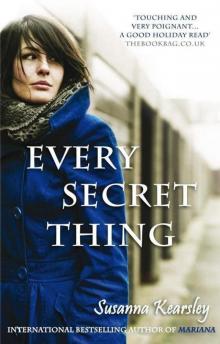 Every Secret Thing
Every Secret Thing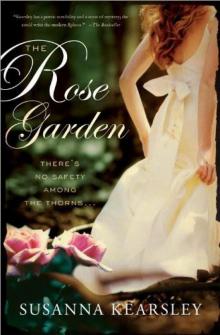 The Rose Garden
The Rose Garden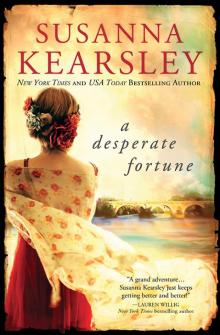 A Desperate Fortune
A Desperate Fortune The Winter Sea
The Winter Sea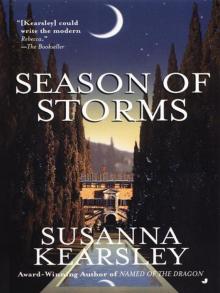 Season of Storms
Season of Storms Mariana
Mariana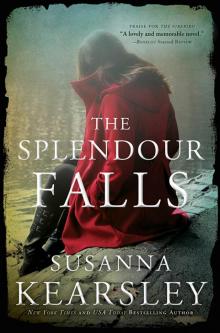 The Splendour Falls
The Splendour Falls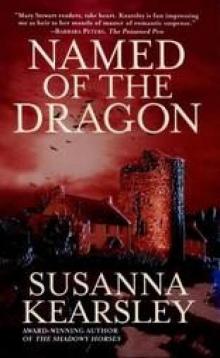 Named of the Dragon
Named of the Dragon Sophia's Secret
Sophia's Secret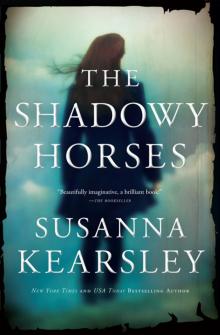 The Shadowy Horses
The Shadowy Horses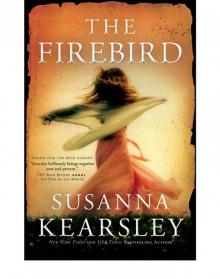 The Firebird
The Firebird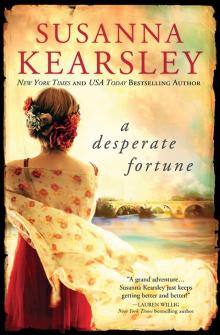 Desperate Fortune
Desperate Fortune